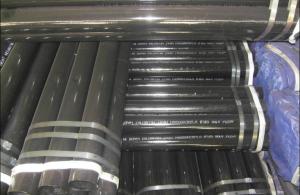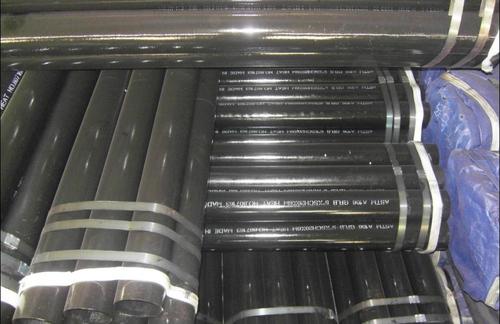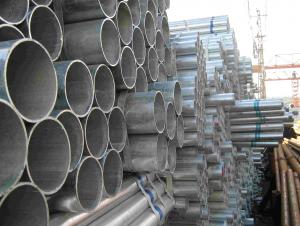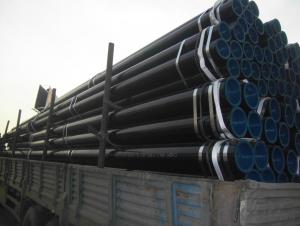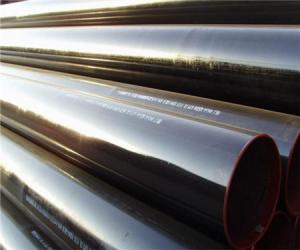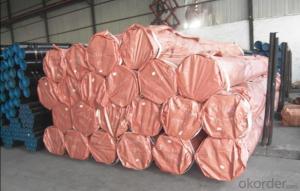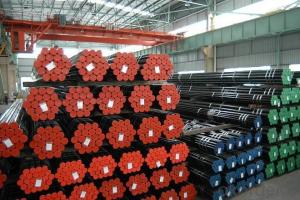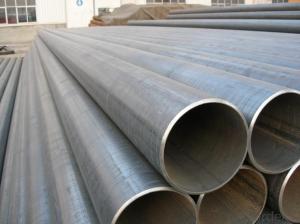Seamless Steel Pipe of 5 Inch API 5L GRAD B
- Loading Port:
- China Main Port
- Payment Terms:
- TT or LC
- Min Order Qty:
- 25 m.t.
- Supply Capability:
- 1000 m.t./month
OKorder Service Pledge
OKorder Financial Service
You Might Also Like
Product Description:
1、Structure of Seamless Steel Pipe of 5 Inch API 5L GRAD B Description:
Seamless pipe is formed by drawing a solid billet over a piercing rod to create the hollow shell. As the manufacturing process does not include any welding, seamless pipes are perceived to be stronger and more reliable. Historically seamless pipe was regarded as withstanding pressure better than other types, and was often more easily available than welded pipe.
2、Main Features of the Seamless Steel Pipe of 5 Inch API 5L GRAD B:
• High manufacturing accuracy
• High strength
• Small inertia resistance
• Strong heat dissipation ability
• Good visual effect
• Reasonable price
3、Seamless Steel Pipe of 5 Inch API 5L GRAD B Images:
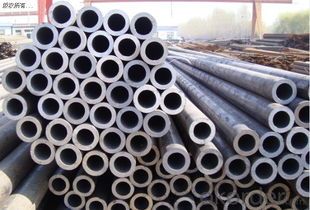
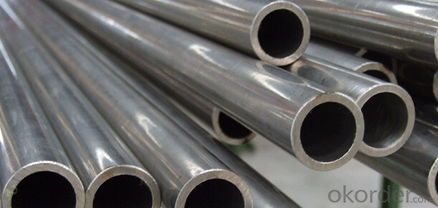
4、Seamless Steel Pipe of 5 Inch API 5L GRAD B Specification:
1. Commodity Name: Seamless steel pipe
2. Standard: API,GB,ASTM,ASME,DIN
3. Quality grade: 10#, 20#, A106B, A53B, API 5L B, Q235, Q345, ST37-2, ST 45, ST52.etc.
4. Dimension:
OD: 1/2"-24"
WT: 2.5-80mm, SCH10~SCH40~XXL
length: 5.8m,6m,8m,9m,12m
5. Technique: Hot Rolled/Cold Rolled/ Cold Drawn
6. application
carbon seamless steel pipes are widely used in gas, water and oil, transpotation;constructions;Bridge,highway,windows of model steel door; building materials;fences;heating facilities Fluid Pipe;conduit pipe,scaffolding pipe.etc.
7. Payment Terms: L/C D/A D/P T/T
8.packing and shipment
Packaged in bundles,as per customers' requirements, it can also bepackagesd as beveled ends, typed marking, black painting, plastic caps protection,woven bags packing
For 20" container the max length is 5.8m; For 40" container the max length is 12m. other options are available based on customer requests. Please discuss when placing orders.
5、FAQ of Seamless Steel Pipe of 5 Inch API 5L GRAD B:
①How is the quality of your products?
Our products are manufactured strictly according to national and internaional standard, and we take a test
on every pipe before delivered out. If you want see our quality certifications and all kinds of testing report, please just ask us for it.
Guaranteed: If products’ quality don’t accord to discription as we give or the promise before you place order, we promise 100% refund.
②How about price?
Yes, we are factory and be able to give you lowest price below market one, and we have a policy that “ for saving time and absolutely honest business attitude, we quote as lowest as possible for any customer, and discount can be given according to quantity”,if you like bargain and factory price is not low enough as you think, just don’t waste your time.Please trust the quotation we would give you, it is professional one.
③Why should you chose us?
Chose happens because of quality, then price, We can give you both.Additionally, we can also offer professional products inquiry, products knowledge train(for agents), smooth goods delivery, exellent customer solution proposals.Our service formula: good quality+good price+good service=customer’s trust
SGS test is available, customer inspection before shipping is welcome, third party inspection is no problem.
Any question, pls feel free to contact us !
- Q: How are steel pipes used in tunnel construction?
- Steel pipes are used in tunnel construction as structural elements to provide support and stability to the tunnels. They are commonly used in tunnel lining systems to create a strong and durable structure that can withstand the pressure and weight of the surrounding soil or rock. Steel pipes are also used for ventilation systems, drainage systems, and for carrying utilities such as water, gas, or electricity through the tunnel.
- Q: Can steel pipes be used for HVAC systems?
- Yes, steel pipes can be used for HVAC systems. Steel pipes are commonly used in HVAC systems for their durability, strength, and resistance to corrosion. They are particularly suitable for high-pressure applications and provide reliable and long-lasting performance in HVAC installations.
- Q: How do you calculate the pipe head loss for steel pipes?
- The head loss in steel pipes can be calculated using the Darcy-Weisbach equation, which takes into account factors such as the pipe length, diameter, roughness, flow rate, and fluid properties. This equation provides an accurate estimation of the head loss based on these variables.
- Q: How do you determine the wall thickness of a steel pipe?
- The wall thickness of a steel pipe can be determined by measuring the outer diameter (OD) and the inner diameter (ID) of the pipe, and then subtracting the ID from the OD.
- Q: Is there a weld on the outer wall of seamless steel tube?
- As you have said this, you have to fake goods is seamless, commonly known as to seamless steel pipe, seamless steel pipe is welded pipe weld reinforcement, and then go inside and outside the weld is worn away, and then burn side is that you say is that, after you can see the wall friction of a weld, is not too obvious. Like a polished, but no wall bulge, can not see the seam,
- Q: What is the hardness of steel pipes?
- The hardness of steel pipes varies depending on the specific grade and manufacturing process used. However, steel pipes are generally known for their high hardness and durability, as they are often designed to withstand heavy loads, abrasive environments, and high-pressure conditions.
- Q: What are the different international standards for steel pipes?
- There are several different international standards for steel pipes, including the American Society for Testing and Materials (ASTM), the International Organization for Standardization (ISO), and the European Committee for Standardization (CEN). These standards define specific requirements for the manufacturing, testing, and dimensions of steel pipes to ensure their quality and compatibility for various applications.
- Q: What is the difference between steel pipes and ductile iron pipes?
- Steel pipes and ductile iron pipes are both commonly used for conveying fluids and gases, but they have notable differences. The main distinction lies in their composition and properties. Steel pipes are made of an alloy of iron and carbon, providing them with high strength and durability. On the other hand, ductile iron pipes are composed of iron, carbon, and small amounts of other elements such as silicon and manganese, which make them more flexible and resistant to bending. Ductile iron pipes also have superior corrosion resistance compared to steel pipes. Overall, steel pipes are preferred for applications requiring higher strength and pressure resistance, while ductile iron pipes are often chosen for their flexibility and corrosion resistance.
- Q: What is the maximum temperature that steel pipes can handle?
- The maximum temperature that steel pipes can handle depends on the specific grade of steel being used. However, most common steel pipes can withstand temperatures up to around 1000 degrees Celsius (1832 degrees Fahrenheit) without significant structural damage.
- Q: What are the safety precautions to consider when working with steel pipes?
- When working with steel pipes, it is important to follow certain safety precautions to prevent accidents and injuries. Some key precautions include wearing appropriate personal protective equipment (PPE) such as gloves, safety glasses, and steel-toed boots to protect against cuts, burns, and impact injuries. It is also crucial to inspect the pipes for any defects or damage before using them and ensure they are properly supported and secured during installation to prevent them from falling or causing structural failures. Additionally, workers should be trained on safe lifting techniques to avoid strain or back injuries when handling heavy pipes. Regular maintenance and inspection of tools and equipment, as well as adherence to proper handling and storage procedures, are also essential for maintaining a safe working environment when working with steel pipes.
Send your message to us
Seamless Steel Pipe of 5 Inch API 5L GRAD B
- Loading Port:
- China Main Port
- Payment Terms:
- TT or LC
- Min Order Qty:
- 25 m.t.
- Supply Capability:
- 1000 m.t./month
OKorder Service Pledge
OKorder Financial Service
Similar products
Hot products
Hot Searches
Related keywords
